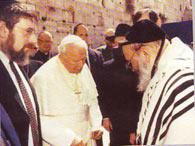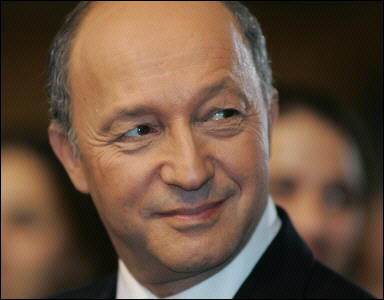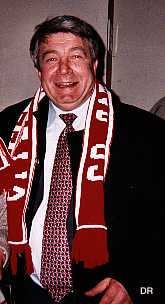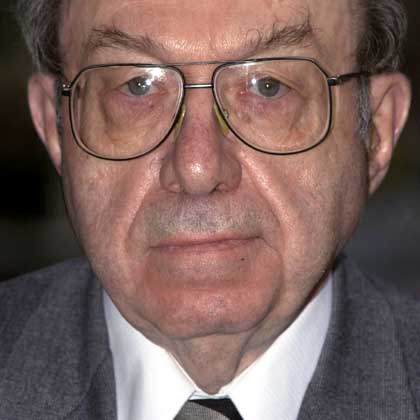Understanding the
Gayssot law
Jessie Aitken
The French anti-revisionist law dates from July 13, 1990. It is known by various names: “Gayssot law”, “Fabius-Gayssot law”, “Faurisson law”, “lex Faurissonia” or “article 24bis” (of the law of July 29, 1881 on press freedom). It provides for a prison sentence of up to a year as well as a maximum fine of €45,000 for anyone who publicly disputes the reality of one or more “crimes against humanity” as defined and ruled on, essentially, by the International Military Tribunal of Nuremberg in 1945-1946. In addition to the prison sentence and fine there can be an order to pay damages to Jewish or other associations as well as the heavy costs of having the decision published in the media: finally, the courts may order the confiscation of any work material, along with books and papers, seized by the police.
It is inaccurate to say that this law forbids the questioning of the entirety of the Nuremberg judgment for it forbids only the questioning of the judgment’s word on crimes supposedly committed against “humanity”, that is, first and foremost, against the Jews. However, the passages in the judgment dealing with that subject amount to but 2% of the said judgment as a whole. Thus one remains free, at least in principle, to dispute publicly the other 98%. Consequently, only the crimes alleged to have been committed, above all, against the Jews are decreed legally unquestionable. Let us salute here the granting of an astonishing privilege to the exclusive benefit of God’s “chosen people”.

Chief Rabbi Sirat (right) - the main promoter of the anti-revisionist law, with the late Pope John Paul II
It was the Jews of France who, in May 1986, were the first to call for the establishment of such a law. At the time the State of Israel was preparing to pass an anti-revisionist bill which was finally to be approved by the Knesset two months later, in July 1986. The promoter of the French anti-revisionist law was the country’s chief rabbi René-Samuel Sirat. It was under his guidance that in May 1986 some Jewish academics, like Pierre Vidal-Naquet, and some Jewish propagandists, like Serge Klarsfeld and Georges Wellers, called for a bill like the Israeli one (Bulletin de l’Agence télégraphique juive, June 2, 1986, p. 1 and 3).
Those Jews had to wait four years to obtain satisfaction. A Socialist-Communist coalition government under the presidency of François Mitterrand at last voted a pertinent bill into law in July 1990. But well before the making of the legislation in question, historical revisionism was punishable by law in France. The most various grounds were put forth: attempt to justify a crime, racial discrimination, incitement to racial hatred, publication of material considered dangerous for the youth, personal injury etc. For example, it was on charges of “apologie de crime” that Maurice Bardèche had been jailed for publishing his Nuremberg ou la Terre promise (Nuremberg or the Promised Land) in 1948.

former Prime Minister Laurent Fabius
The politician whose action was decisive in the preparation and passage of the July 13, 1990 law is former Prime Minister Laurent Fabius. Today a prospective candidate for the French presidency in 2007, Fabius is a Jew, a millionaire and a Socialist. In 1990 he was president of the National Assembly. In that Assembly was a rather uncouth and ill-educated Communist, Jean-Claude Gayssot, then Minister of Transport. This man wanted to present, in the name of the Communist party, an anti-racism bill targeting Jean-Marie Le Pen, head of the Front National. But his bill was badly drafted. It was then that Laurent Fabius made an arrangement with his Communist colleague. He, Fabius, would replace the poorly constructed text with one prepared by the Socialist party which targeted both Le Pen, for “racism”, and professor Robert Faurisson, for “denial of the extermination of the Jews”; Fabius would also grant Gayssot the privilege of bringing this bill under his name, a bill that had become really and truly both anti-racist and anti-revisionist. Once the deal had been concluded between the Jew Fabius and the Communist Gayssot, there remained the procedure of defending their bill before the National Assembly and Senate. The task looked daunting. A number of jurists, academics and politicians came out against the principal of such a law, deemed Stalinist, but then, suddenly, a providential event enabled its passage by the Socialist-Communist majority. In effect, on May 11, 1990 there exploded in the world press the outrage of “desecrated” Jewish graves in a cemetery in Carpentras, a small town in the south of France. Fabius took the helm of a thundering propaganda operation meant to have people believe that there was a resurgence of anti-semitism in France, an anti-semitism fuelled by revisionism. Tens of thousands of demonstrators, many of whom bearing Israeli flags, were to march in the streets, notably in Paris where, for the first time since August 1944 and the city’s liberation, the great bell of Notre Dame cathedral was set droning. The intimidation was so strong that the required minimum of sixty members of either the National Assembly or the Senate could not be mustered to put the bill before the Constitutional Council for assessment to determine whether or not it conformed to the French Republic’s constitution.

Communist deputy Jean-Claude Gayssot,
co-author of the anti-revisionist law
But once the anti-revisionist law was on the statute books, it proved rather hard to apply. The first conviction under it was handed down in Paris in April 1991 against Professor Faurisson and, in these past fifteen years, it is likely that the total number of other definitive guilty verdicts, whether concerning the professor or other revisionists, adds up to about twenty. The financial penalties have at times been very heavy and, in more recent years, sentences of imprisonment without remission have been pronounced, but up to now no one has actually been incarcerated in France on the sole grounds of the July 13, 1990 anti-revisionist law.
This law is of a Soviet nature. It especially suppresses the freedom of research. However, this freedom cannot normally see itself assigned boundaries in matters of history. The history of men is made up of billions of events about which everyone, in principle, is allowed to ask himself questions and freely put forth his interpretations. One may therefore wonder how a point, and one alone, of that history, amongst billions of others, can thus be singled out from the rest and declared off-limits to researchers. For decreeing in advance the result at which the researcher must arrive amounts to prohibiting true research. It is a Stalinist act, for instance, to tell a researcher studying “the problem of the Nazi gas chambers”: “1) You must conclude from your work that the Nazi gas chambers really did exist and operate even though we possess no forensic report establishing the existence of a single one of those weapons of mass destruction; 2) You must, besides, conclude that those chemical slaughterhouses had a real existence in such or such camp and a fictitious existence in another; 3) You must, finally, conclude that the total number of Jewish deaths in the Second World War remains invariably six million, as the judges at Nuremberg decreed it ex cathedra without having been able to base their ruling on any investigative report *”.
It is astounding that a law of the French Republic should thus declare the infallibility, in regard to history, of a mere tribunal, that of Nuremberg. That tribunal called itself “military” when in fact it was not. It called itself “international” when it was only inter-allied. It was not even a tribunal in the proper sense for, composed exclusively of victors in a recent war trying exclusively their own vanquished opponents, it was both judge of and party to the cases it heard. It tried those matters with a self-bestowed supreme authority, its judgment thus admitting of no appeal. It practised the retrospective application of laws. It instituted the principle of collective responsibility. It was “not be bound by technical rules of evidence” (Article 19 of its Charter). It did not demand that any evidence be produced to prove “facts” that it considered, without giving its reasons, as being “of common knowledge”, and it automatically received as genuine evidence, rendered such by its own “judicial notice”, any report submitted by the Allied powers’ various war crimes commissions accusing the defeated defendants (Article 21).
If, in France, this law was demanded by the most influential Jews it is because those people were panic-stricken upon realising that the historians in place were incapable of answering the revisionists on the level of scientific, technical and historical argumentation. When, in 1978-79, professor Faurisson made plain the technical impossibilities of mass killings in gas chambers as alleged for the German wartime camps and when he launched his challenge: “Explain to us how such mass murder was, as you see it, technically possible”, he got the pitiful reply: “It must not be asked how, technically, such mass-murder was possible. It was technically possible, since it happened” (Le Monde, February 21, 1979). R. Faurisson has in a like manner put a whole series of very simple questions which those to whom they are addressed have been unable to answer. Moreover, he has proved that photographs and documents invoked by his accusers were, on the one hand, either altered or falsified or, on the other hand, wrongly presented so as to seem to show things that in fact they did not. He was answered with physical assaults, a de facto ban from teaching and, above all, by lawsuits and prosecution. But these court cases have not really taken the course hoped for by the Jews. Certainly, the professor has been held liable, for example, for “personal injury” but never, as the Jews have requested, for “falsification of history”. On the contrary, on April 23, 1983 the first chamber of the Paris Court of Appeal found against him whilst at the same time paying solid tribute to the quality of his work on what it called “the problem of the gas chambers”. That court concluded that, in the work in question, there was no trace of rashness, of negligence, of his having deliberately overlooked anything, nor any trace of a lie and that, as a consequence, everyone must henceforth be entitled to state that the Nazi gas chambers had never existed! The decision bore words, in the language of superior judges, to the precise effect that “the appraisal of the value of the findings [on the gas chambers] defended by Mr Faurisson is a matter, THEREFORE, solely for experts, historians and the public.” In the period leading up to the “Gayssot Act’s” passage, the Jews were also aware that the professor had been, on the historical and scientific plane, the instigator and organiser of the defence of Ernst Zündel in that most valiant revisionist’s two long trials in Toronto in 1985 and 1988. Those trials turned into a particular catastrophe for the Jews Raul Hilberg and Rudolf Vrba. The former could be considered as the Number One historian and the latter as the Number One witness of the alleged “destruction of the European Jews”.

Raul Hilberg - the number one exterminationist historian, humiliated during the Zundel trials in Canada
The revisionists have thus piled up a long succession of victories. But the general public are unaware of it. The Jews’ hold on the media and their many means of intimidation are such that, until the appearance and widespread development of the Internet, the public have largely been kept in ignorance of those victories.
Today the French anti-revisionist law is still in force but those who had the idea that it would be a rampart against revisionism’s progress are disillusioned. By the very fact of its existence, this law has in a way become one of the best pieces of proof that the official history is powerless to defend itself with arguments, evidence and documents in a free public debate.
That debate in the open is something the revisionists have never ceased to propose and, however violent the repression exerted against them is to be, they will not stop calling for it. The revisionists are not afraid of the light; on the contrary, they seek it.
* The Nuremberg judges wrote that this figure of six million came from Eichmann. However, they knew that it was a question of an estimate ascribed by one of the American accusation team’s collaborators, the SS officer Wilhelm Höttl, to his colleague Adolf Eichmann (who had disappeared). In 1961, in Jerusalem, the latter made a formal denial before an Israeli court and, in 1987, Höttl ended up saying that no importance must be attached to that “estimate” for Eichmann… was drunk the day he made the remark in… September 1944!
click here for a report on the Faurisson-Badinter case
latest news from Italy - university closes campus in effort to gag Faurisso |
 |
|